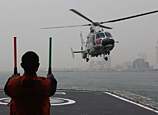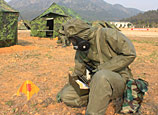
According to some recent industry figures from Brazilian aerospace conglomerate Embraer SA, China is projected to have a business jet fleet of 650 by 2022, accounting for 7 percent of the world's total, valued at $24 billion.
Current estimates put the proportion of registered business jets in the Chinese mainland at less than 1 percent of those in the United States.
Global jet manufacturer Airbus SAS said recently it expects to deliver five large business jets to the Chinese marker every year. It has already sold 20 corporate jets to China.
As the US and EU continue to struggle as corporate jet markets, China has become the new growth engine for international players, say industry experts.
Ten years ago, another leader in global aviation, Hawker Beechcraft, said it expected 70 percent of its business jet demand to come from the US, but currently the majority of its aircraft are being sold elsewhere.
In 2011, China became French corporate jet aircraft manufacturer Dassault Falcon's largest market by aircraft sales, and the company said the number of Falcons operated in China tripled by the end of 2012.
In order to better tap the market, the company established a new subsidiary in Beijing in 2012, and a regional customer service headquarters is scheduled to start operating on June 1.
Sha Changan, the deputy general manager of China Aviation Industry General Aircraft, confirmed that the Primus 150 aircraft developed by his company will begin test flights at the end of the year.
A turboprop aircraft seating five passengers and with a range of 1,850 km, the 150 is the first non-military aircraft developed and produced by a Chinese company.
The 150 will be equipped with a turboprop engine developed by GE of the United States.
Xiong Xianpeng, CAIGA's deputy chief engineer, said GE is not only a supplier but also a partner in its design and project management.
"The China market (for private jets) is still in its infancy, like the auto market was 30 or 40 years ago," he said.

















 Photo: Bird flu fears hits poultry industry
Photo: Bird flu fears hits poultry industry


![]()
